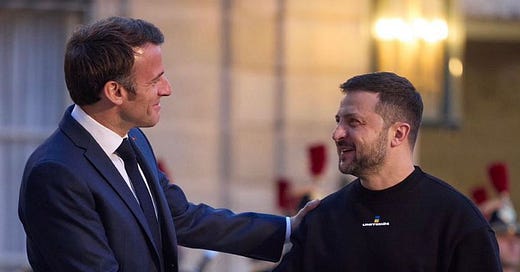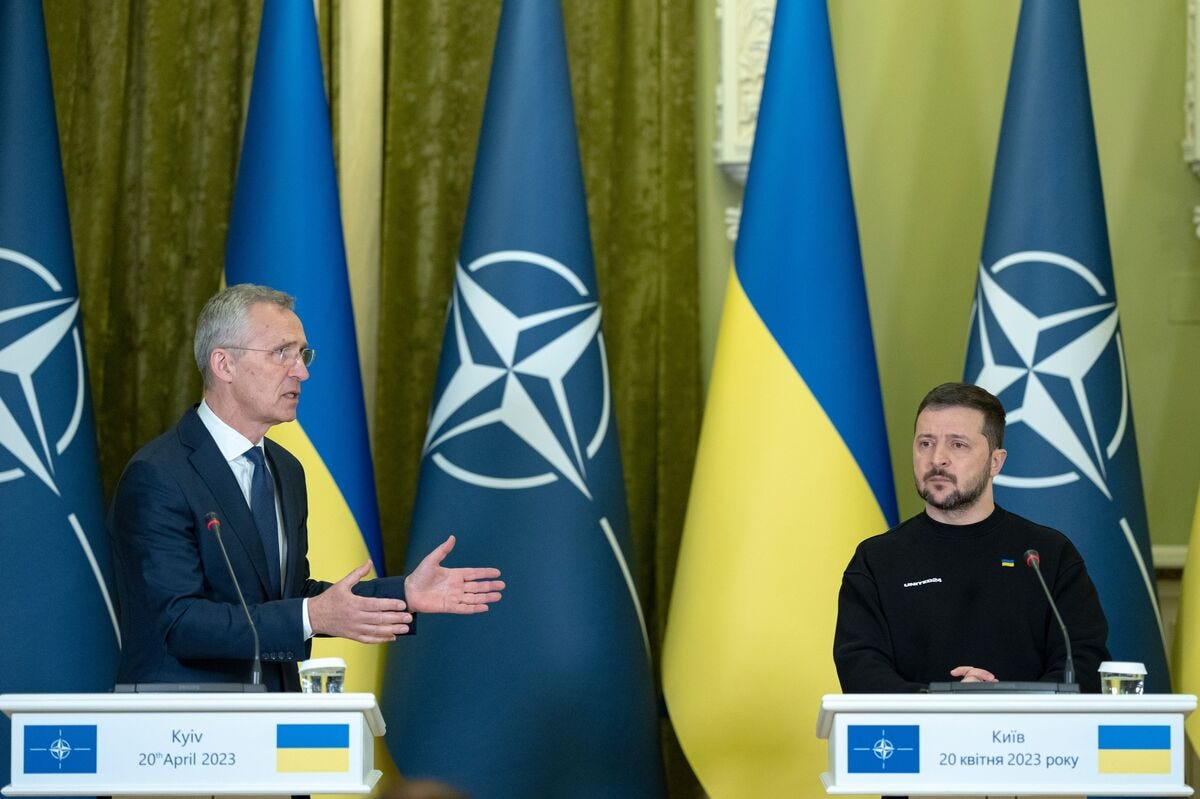Jun 16: Nicolas Tenzer, Macron Signals a Transformation in Security Policy
As published by CEPA on June 11, 2023
Macron Signals a Transformation in Security Policy
By Nicholas Tenzer, CEPA, June 11, 2023
The French leader is seeking to clear away past impressions and craft a possibly transformative new role in aiding Ukraine and other states bordering Russia.
President Emmanuel Macron’s speech in Bratislava on May 31, seemed to herald a remarkable change of tone. Having attended the event and heard the reactions of the audience, I can attest to the positive sense of surprise. He also used the strong words needed to define the fight — our fight — that Ukraine now wages: “Ukraine today protects Europe, it brings guarantees of security to Europe”.
First and foremost, the French President broke with a sort of French tradition in the assumed superiority of Western Europe within the European Union (EU.) Macron now refuses to use the term enlargement and proposes instead to talk about the “reunification” of the continent. These are not mere semantics, they matter. Criticizing one of his predecessors, Jacques Chirac, who in 2003 had asked the countries of Central and Eastern Europe to “shut up” after some of them supported George W. Bush’s war against Iraq, he stressed that it would have been better to have listened to them. This is a statement of French high policy very different from at least the last 20 years and is very clearly aimed at repairing broken — or at least damaged — bridges to the region.
He also pointed to his own mistakes, for example, when he implied in a speech on September 1, 2022 that certain Central and Eastern European countries were “warmongers”, and before that, when he had upset them with a policy he considered too complacent towards Moscow.
In the same vein, he had also denounced the inconsistency of the French and German positions at the Bucharest summit in April 2008, which were not accompanied by any security guarantees for Ukraine and Georgia (with profoundly damaging consequences thereafter.) Without being self-critical about his past positions, which expressed hopes that Russia might rejoin the European rules-based order, he had to implicitly acknowledge that these expectations were unfounded. Although the French president had been moving in this direction for some months, it now seems clear that he will no longer be riding the horse of re-engagement with Putin’s regime. There was no mention in his speech of “security guarantees” for Russia, or even of future negotiations with it, even at some distant point in the future.
Whereas Macron once spoke of a possible peace when Ukraine decided to seek it, leaving some to assume that Paris might push Kyiv in this direction, he now even speaks of peace “on Ukraine’s terms”, in an increasingly explicit endorsement of Volodymyr Zelenskyy’s 10-point peace plan. What’s more, he mentions the requirements of international law in terms of both borders and justice. On a symbolic level, it also recognizes that Ukrainians are fighting for the freedom of all Europeans.
Two other points reflect a notable shift in Macron’s thinking. The first concerns the indispensable nature of the security guarantees to be granted to Ukraine.
Although he had affirmed the principle, he now went further, referring to the multilateral or bilateral framework that could give substance to these guarantees. Above all, he seems to regret the lack of unanimity — a statement implicitly aimed at the US — among NATO members to grant Ukraine a Membership Action Plan (MAP), a bureaucratic route map that ends with alliance membership.
He also shows a desire to move towards concrete results in Vilnius at the NATO summit on July 11-12, because he knows that a repeat of the messy Bucharest compromise of 2008 would tarnish the credibility of NATO and democracies in general, while at the same time engendering terrible frustration in Kyiv — I was able to see during my trip there, three days before Bratislava, how tenacious and persistent this concern was. As Macron now acknowledges, the Brussels organization is no longer “brain-dead.” He clearly recognizes its indispensability, which cannot be fulfilled by other structures.
The second issue is the EU membership prospects of Ukraine and Moldova, as well as the six Western Balkan states. While France has been reluctant to approve most EU enlargements, and considered reform of the EU’s institutions and procedures a prerequisite, these prejudices have now been lifted. Macron is now clearly signaling a willingness to open accession negotiations with these two countries at the European Council meeting in December. He is certainly not abandoning his idea of institutional reform, which is essential, but considers it should not be a pretext for postponing enlargement time and again.
Finally, Macron places his plea for a Europe capable of acting on its own, and less dependent not only on Russian energy sources but also on American support, in a new framework. Whereas his previous pleas for strategic autonomy, often misunderstood in its multiple facets, may have been worrying, particularly in Eastern, Central, and Northern Europe — as some saw in them a renunciation of NATO and a desire to find a third way in relations with Russia and China — his updated idea is gaining credibility. Europe must become capable of taking action, even if the United States abstains; just think what would have happened if Washington had refused to arm Ukraine after February 24, 2022, not to mention Syria in 2013 when President Obama (encouraged by the British Parliament’s vote to abstain from action) refused to enforce his own red lines after the chemical attacks on Ghouta which killed more than 1,400 people. What, Macron asks, happens if a new administration withdraws from the world stage? And thus, Europe must do more for Ukraine, not less. That is a new mindset.
Of course, Macron now needs to make policy from his ideas. Even if not all French arms deliveries are the subject of public communication, and even if the upgrading of arms and increased munitions manufacturing has not yet been completed — despite already large increases over the last few months — it is indisputable that the French war effort has intensified.
Despite Macron’s still-cautious words on Vladimir Putin’s trial by international justice, France has been a pioneer in helping Ukraine gather evidence of war crimes. It also supports the establishment of a special tribunal to judge the crime of aggression
France now has major opportunities:
to be at the forefront of the fight for Russia’s total defeat both in Ukraine and beyond (it’s no coincidence that the French President mentioned that Georgia and Belarus are likewise under Russian pressure);
to take the lead, on the European side, in supplying decisive types and quantities of weapons for the Ukrainian counter-offensive, at a time when the United States seems to be marking time somewhat;
to take the initiative, as I’ve been suggesting for some weeks now, of sending troops to the re-conquered territories of Ukraine under both the NATO banner and under the EU banner — possibly along with the UK — in order to make this part of the Ukrainian territory safe even before it joins NATO; and
in the medium- and long-term, to maintain the toughest possible sanctions against Moscow, and to help organize a transition process in Russia.
For a long time, attempts to re-engage with Putin’s Russia had thwarted Macron’s European “grand design.” The end of these illusions offers him the opportunity to be a European leader in the full sense of the term following his offer of “reconciliation” with the countries of Central and Eastern Europe. Will he seize it?
Nicolas Tenzer is a Non-resident Senior Fellow at the Center for European Policy Analysis (CEPA) and Chairman of the Center for Studies and Research on Political Decision (CERAP). He is currently a guest professor at the Paris School of International Affairs (PSIA, Sciences-Po), and a blogger on Tenzer Strategics, a blog on international security and foreign policy issues. He is a former director of the online journal Desk Russie.





